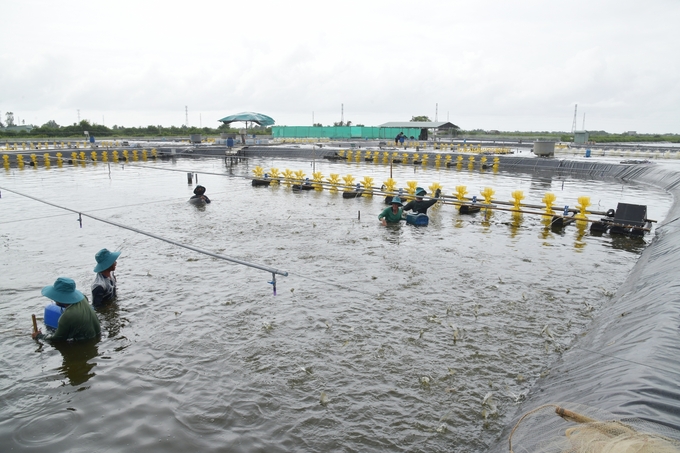June 7, 2025 | 11:56 GMT +7
June 7, 2025 | 11:56 GMT +7
Hotline: 0913.378.918
June 7, 2025 | 11:56 GMT +7
Hotline: 0913.378.918
The MARD acknowledges and values the hard work of the Department of Animal Health (MARD) and the entire veterinary sector for their comprehensive completion of assigned tasks, progressive transition into practice, achievements of positive changes, and exceptional results in the first six months of 2024.
The Department of Animal Health advised the Ministry to submit directives to the Prime Minister that are timely and effective in preventing and controlling the importation of animals and animal products and the prevention and control of animal diseases.
Simultaneously, it effectively executed national programs and plans that were authorized and directed by the Prime Minister. It promptly advised and submitted legal documents and directives concerning veterinary work to the Ministry.

Deputy Minister of Agriculture and Rural Development Phung Duc Tien visited the biosafety pig farm of Amafarm Livestock Breeding Company Limited in Hai Duong. Photo: Hong Tham.
Despite the escalation of African swine fever since mid-May 2024, the continued effective management of a variety of animal diseases has fostered favorable conditions for the development of aquaculture and livestock.
The prevention and control of animal and animal product smuggling are advised and directed, while the inspection of animals and animal products is still being reviewed and rigorously verified. Obstacles to announcing veterinary drug conformity for enterprises must be resolved and eradicated in a timely manner.
Promoting animal and animal product exports, inspection, and administrative reform through international cooperation and veterinary negotiations has yielded numerous positive outcomes.
Nevertheless, in the final months of 2024, the Department of Animal Health and its units must be resolute and dedicated to successfully completing the assigned tasks for the entire year. This includes the timely advice, decisive, and effective implementation of disease prevention and control measures, particularly avian influenza, rabies, African swine fever, foot-and-mouth disease, and diseases in farmed aquatic animals. Additionally, the inspection, control of animal slaughter, and veterinary drug management must be prioritized.
Following the directives of the Prime Minister and the MARD, the prevention and control of terrestrial animal diseases should be prioritized through inspection, disease prevention and control advocacy, and the organization of regular and supplementary vaccinations against dangerous diseases in animals, including avian influenza, rabies, African swine fever, and zoonotic diseases.
Proactively implement the monitoring of livestock and poultry diseases, particularly in high-risk areas and areas where diseases have previously been observed, to detect, warn, and comprehensively manage new disease outbreaks as soon as they are identified, thereby preventing widespread transmission.
Guide, inspect, supervise, and encourage the implementation of six national programs and plans for the prevention and control of animal diseases. Report animal disease data comprehensively and accurately as necessary to detect, warn, and apply disease prevention and control measures promptly.
Guide the direction and organization of the construction of safe animal disease-free zones and chains to satisfy domestic consumption and the requirements for animal and animal product exports, with a particular emphasis on disease-free zones that adhere to the regulations of the World Organization for Animal Health and the agreements signed with China and Guangxi province.
At the same time, effectively execute the national plan for the prevention and control of aquatic animal diseases; proactively monitor, warn, investigate, and manage disease outbreaks to manage aquatic animal disease prevention and control proactively.
Direct the activities of disease prevention, disease monitoring, the construction of disease-free facilities, and the responsible use of antibiotics in aquaculture.

The Ministry of Agriculture and Rural Development directed the Department of Animal Health to proactively monitor, warn, investigate, and handle outbreaks to proactively prevent and control aquatic diseases. Photo: Hong Tham.
Form working groups to evaluate the prevention and management of aquatic animal diseases in numerous provinces and cities. This will enable the identification of the current state of affairs, the formulation of potential solutions, and the direction of localities to provide transparent disease data. Analyze, evaluate, and promptly propose effective solutions for disease prevention and control in aquaculture based on this.
Coordinate a conference on the prevention and control of aquatic animal diseases in collaboration with pertinent units during the final months of 2024, in the third quarter of 2024.
Continuing to guide and assist localities and enterprises in constructing disease-free zones and facilities for export purposes.
The Department of Animal Health report indicates that the nation has certified 1,930 disease-free zones and facilities in 60 provinces and cities. In particular, there are 800 disease-free zones and facilities for poultry, 1,078 disease-free zones and facilities for livestock, and 52 disease-free zones for rabies.
Translated by Linh Linh

(VAN) VAAS and numerous Vietnamese enterprises have signed cooperation agreements with Japanese partners to promote agricultural technology and trade connectivity.
/2025/05/29/5625-12-214801_567.jpg)
(VAN) Provincial mergers in the Mekong Delta promise to streamline administration, expand inter-provincial raw material areas, and foster close linkages in agricultural value chains, benefiting both businesses and cooperatives.

(VAN) Merging Mekong Delta provinces contributes to the expansion of agricultural raw material areas, addressing previous constraints caused by provincial boundaries. Additionally, this expansion will reduce costs and strengthen linkages between businesses, cooperatives, and farmers.
/2025/05/29/1043-2-153730_145.jpg)
(VAN) The Government's policy to merge provincial-level administrative units opens up major opportunities for the Mekong Delta region to reshape its agricultural development strategy toward large-scale production, effective regional linkages, and sustainability.

(VAN) The mutual export of agrifood products between the European Union (EU) and the United Kingdom (UK) must occur again without certification, border controls or other red tape. This was agreed at the UK-EU summit.
/2025/05/22/5121-2-173645_677.jpg)
(VAN) NBSAP Tracker identifies strengths and areas for improvement in the National Biodiversity Strategy, based on each region’s priorities and capacities.

(VAN) The draft amendment to the Circular on rice export trading stipulates a periodic reporting regime for rice exporting enterprises.